The best BBQ Delivery Boxes in the UK from small sustainable British Farms
Off the back of its award-winning 2019 investigative series, CEREAL, comes Farmerama Radio’s second in-depth production, Who Feeds Us? We give you the low down on each episode…
WHO FEEDS US? EPISODE 5: Cultivating abundance
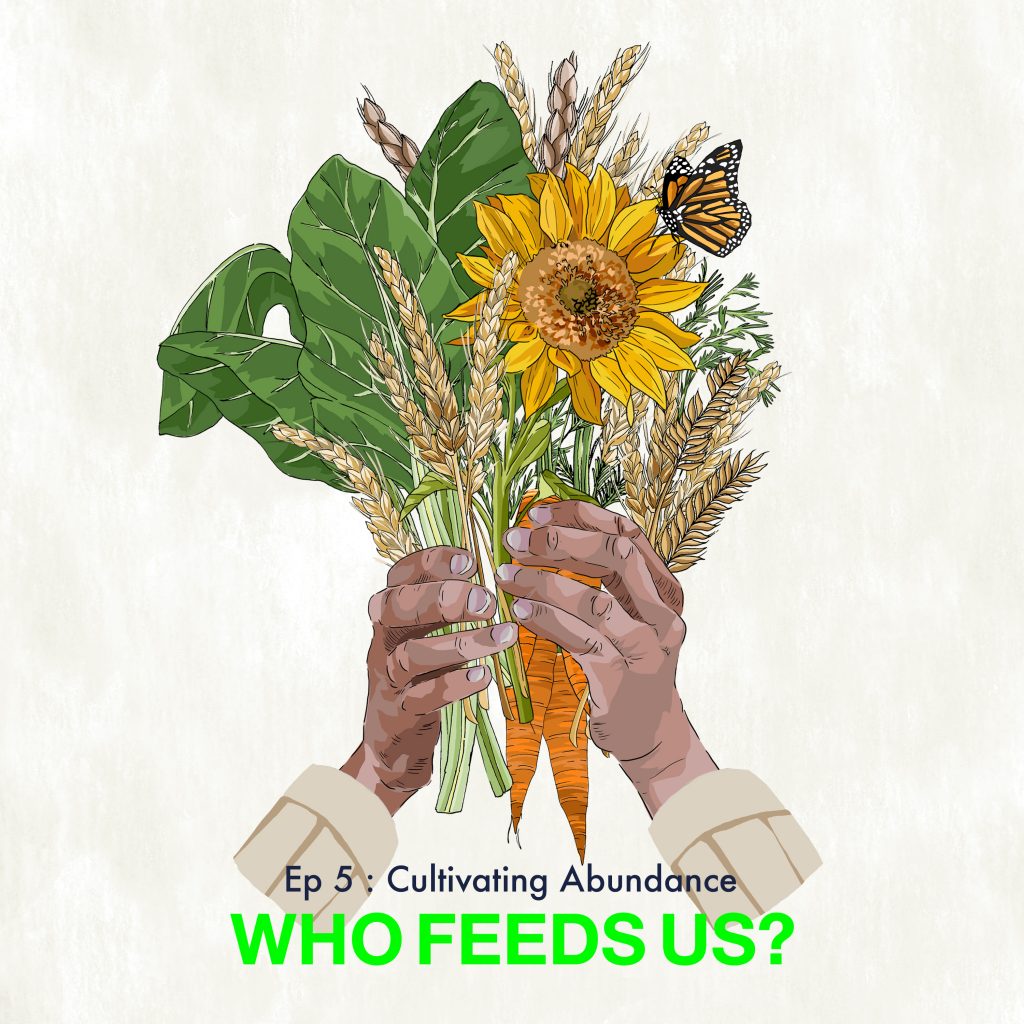
What’s it about?
This episode is not so much about ‘who feeds us?’ but more, ‘how do we feed ourselves?’. It passes mike to people of African heritage in Birmingham and the West Midlands, who are centering community projects around urban food growing.
This sounds like a modern, almost hipster idea. Birmingham as a green, thriving hub of farming? you might be forgiven for thinking. But, you’d be mistaken.
Dr Lisa Palmer, an academic who conducted archival research into the histories of allotments in Birmingham, reveals how it was once the UK’s allotment capital. She unearths the long history of African and Caribbean people in Britain growing food and maintaining connections to their heritage through allotment gardening.
Lynda Macfarlane is reviving this connection through Vegan Vybes Earth Gardens, a Birmingham community group that creates space for people – particularly women of African descent – to grow food, or flowers or just to come and read a book in a beautiful setting. She explains how growing food and flowers is important for mental health and is about justice as well as dignity.
Finally, Andre Reid, designer and co-founder of Kiondo, shares his mission of taking urban gardening the norm, and his vision for enhancing city life by creating access to an abundance of food.
Key takeaway?
Food is at the heart of community projects for a reason. It brings people closer to one another and creates space to share and be generous with our time, experience and fruits of our labour – essentially, it creates a more equitable way of living that doesn’t solely revolve around money.
And everyone is a lot richer for it.
WHO FEEDS US? EPISODE 4: Whole meal
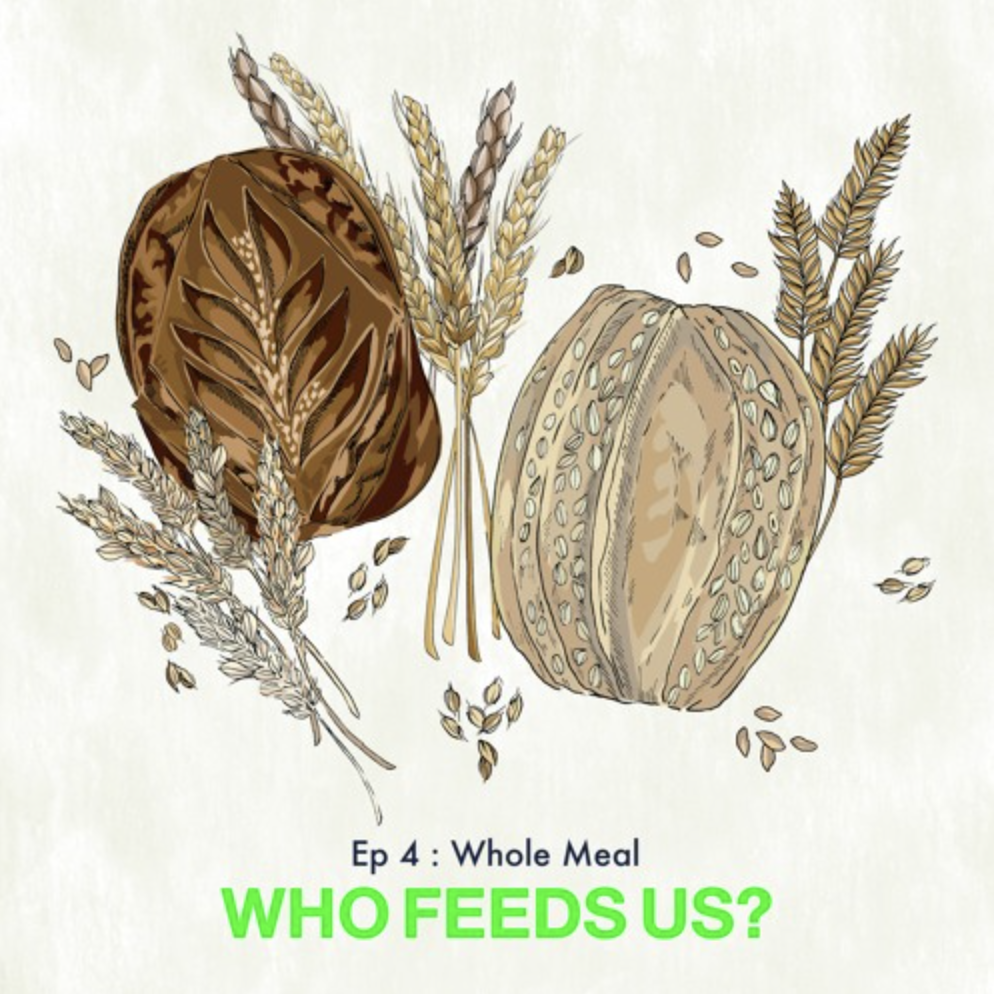
What’s it about?
So, lockdown bred a nation of breadmakers. But, it wasn’t until flour became in short supply that many of us started to think about where our flour was coming from. And then the supermarkets restocked the shelves and saved the day! The End.
Or rather, the beginning. Because that’s quite obviously a joke. It was the volunteers who had kept heritage mills running that saved the day and provided for local food banks and networks of local independent shops. It was the bakers that fed local communities with nourishing bread, connecting the farmer who grew the grains to the consumer who reaped the rewards. The moral of this story lies not just in not just what you know but also the decency of who you know (those who didn’t sell out to the highest bidder in a demand-led market).
This episode follows the stories of volunteer miller Abigail Holsborough from Brixton Windmill and bakers Rosy Benson from Field Bakery in Somerset and Rosie Gray from Reviving Food in Scotland.
Key takeaway?
A quote from Rosie Gray sums up the sentiment of this episode – in fact the whole series – for me:
“You feel like you’ve got this opportunity sat on a plate right in front of you and you don’t even know the questions to ask. I remember really feeling like that – to know so little to not even know how to start asking.”
We don’t have to know all the answers, but we do have to start asking Who Feeds Us?
Listen to episode 4: Whole meal
WHO FEEDS US? EPISODE 3: Growing our own
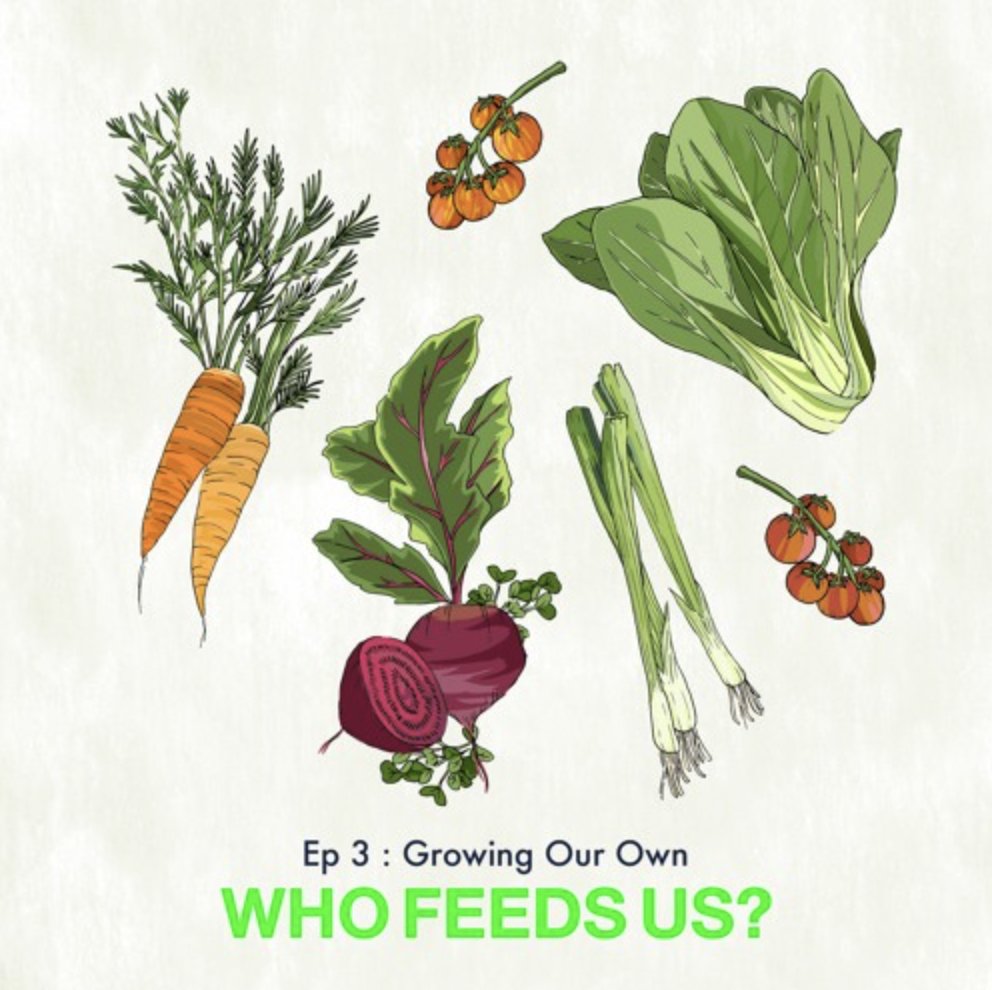
What it’s about?
During lockdown, with increasingly long queues at the supermarket and a long (British) summer ahead, people took ownership of their food supply. We started gardening and we started composting in towns and cities as well as the countryside. In this way, for a short while at least, the average British farmer was no longer a 60-year-old white man.
Farmers came in the form of Astrid Guillabeau, an east-Birmingham mother who started asking the question, “how do we live in cities and produce our own food?” and founder of No Diggity Gardens, Neville Portas, who realised that he needed to make allotments feel like safe places for everyone in the community, especially women and people of colour. Dee Woods, a food actionist, and co-founder of Granville Community Kitchen, speaks of how growing food is a form of liberation and connection. While, Helene Schulze, from Seed Sovereignty, paints the global picture of how this all starts with the seed – and why seed sovereignty is essential to people being able to produce and access sufficient, healthy and culturally acceptable food.
Key takeaway?
How does a conversation that begins with growing our own food in gardens, allotments, and hanging baskets when you live in a flat on the 15th floor, end up being about so much more than tomatoes?
“I think we have it in our head constantly ‘don’t touch it, it’s dirty’,” says Guillabeau. She’s talking about the soil but this episode raises a number of important conversations about the politics of food and, as Woods puts it, “the underlying structural issues of our food systems that affect people’s ability to eat good food”.
Listen to episode 3: Growing our own
WHO FEEDS US? EPISODE 2: Land, Animal and journey
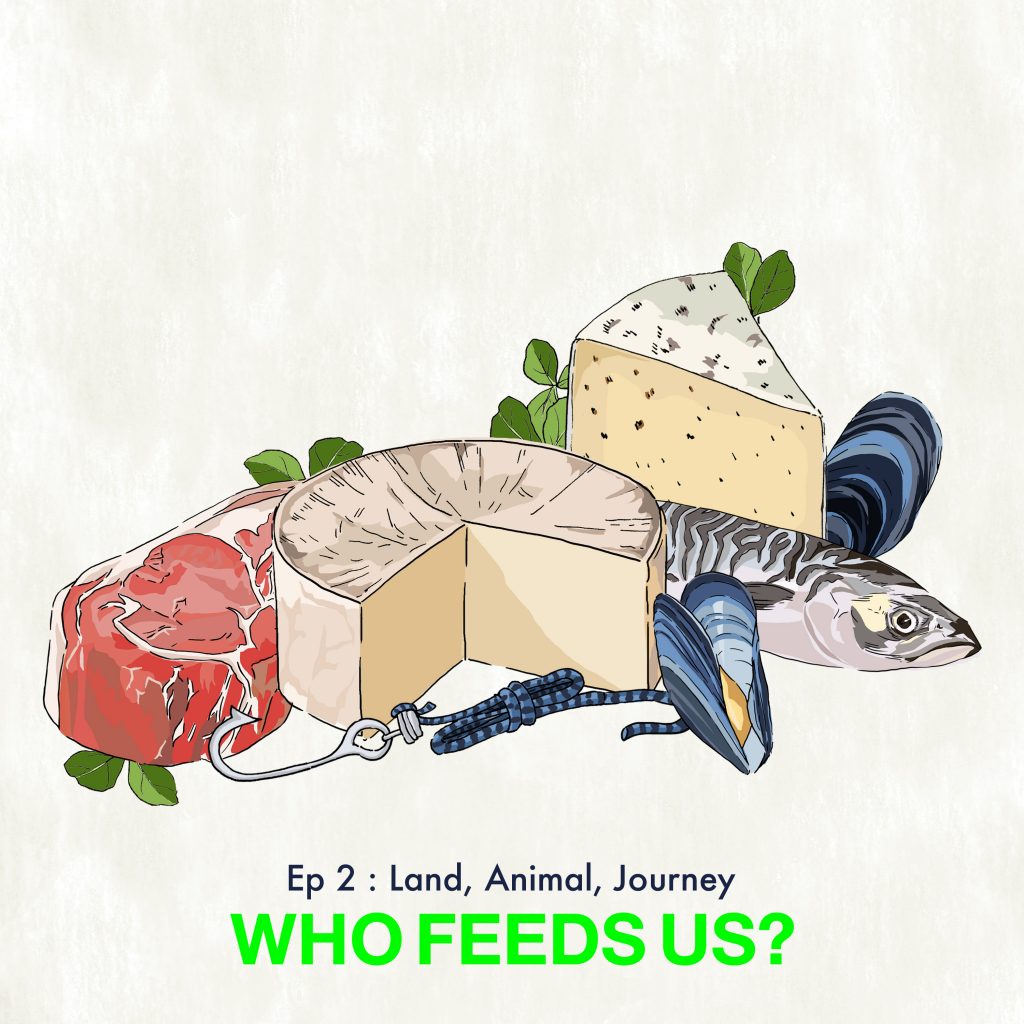
What’s it about?
With the sounds of the dairy in the background, episode 2 transports us instantly to Northern Ireland, where Dean Wright, a dairy farmer and artisan cheese-maker at Ballylisk in County Armagh, lost 70% of his customers overnight when restaurants were forced to close.
He estimates he had enough reserves for the business to last a week without its biggest orders and so he pivoted almost immediately to start delivering milk to the local community. Here, he found an appreciative customer base and he discovered he could quickly meet more of their needs by adding artisan products from other farmers and producers nearby to his deliveries.
John Martin Tulloch, a fishmonger in the Shetland Isles, found himself in a similar position to Wright. He instantly lost his market on the UK mainland – and this led him to find a new customer base much closer to home.
Both their stories are ones of incredible resilience. But, they are told in such a calm and matter of fact way that it takes some time to process the true horror of what they were faced with and how close our modern-days food systems push our farmers and fishers to the edge.
Muhsen Hassanin, a smallholder and Halal slaughterman in Wales, was faced with the opposite problem. Demand for their meat went through the roof and, initially, they didn’t have the systems in place to fulfil the orders. Guided by his belief in fair share and people care, they served their community with grace, refusing to raise their prices when others did so, and not allowing his customers to over order or hoard to ensure there was enough to go around.
Key takeaway?
How farmers and food producers came together when they were pushed to the limits, supporting each other as well as providing food for their communities. Wright expands his milk delivery service to include other farms in the area; Hassanin refuses to raise his meat prices for customers but offers to pay more if the farmers that supply him need him to; and with fish prices crashing, fishers in the Shetlands work as a team to fish to demand and keep supply and prices more stable. Together, their stories prove food doesn’t have to come at the expense of dignity, that food connects communities, and there is more than enough to go around if we share what we have and don’t take more than we need.
Listen to episode 2: Land, animal and journey
WHO FEEDS US? EPISODE 1: The Hungry Gap
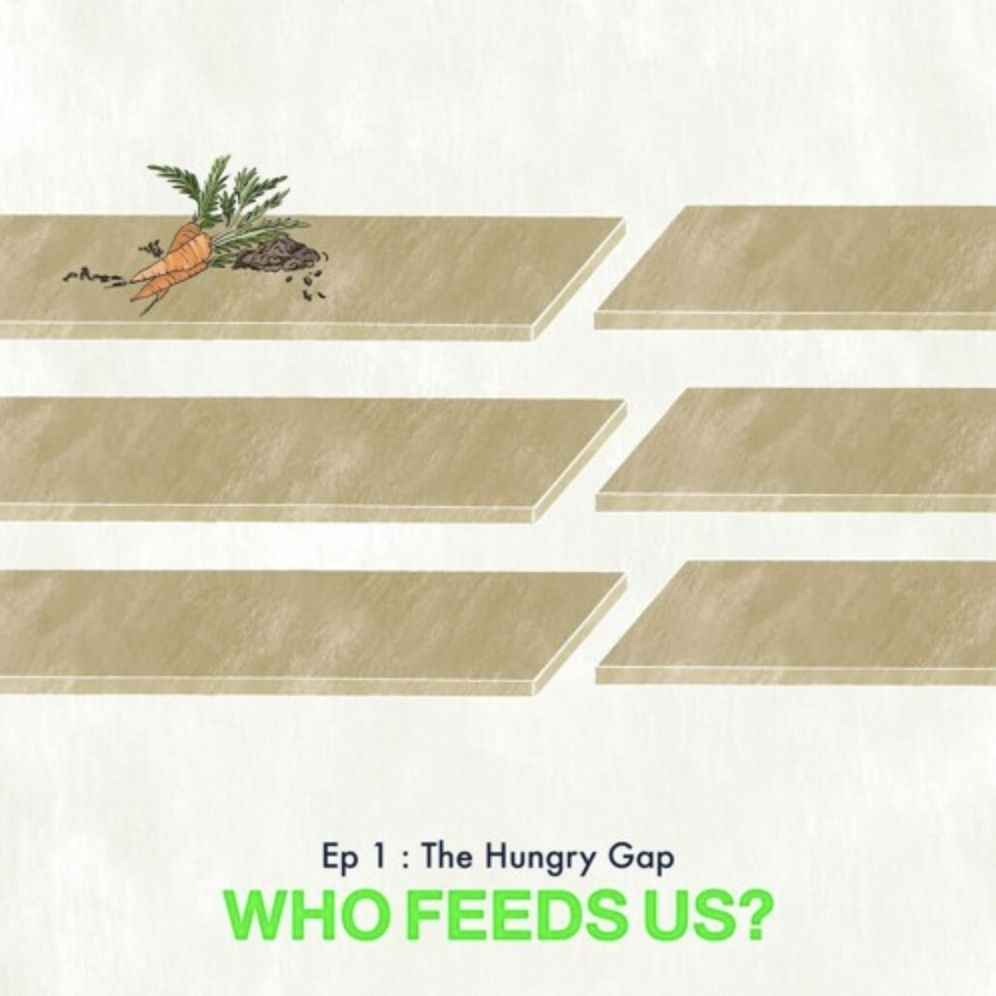
What’s it about?
The introductory episode to the Who Feeds Us series begins gently, with a conversation between cook Syke Gyngell, and farmer, Jane Scotter. We learn how the two work exceptionally closely to produce the seasonal food Gyngell’s restaurant Spring is renowned for – that there is a much bigger story to the food on our plates than what’s created in the kitchen.
This is a theme that Angus Buchanan-Smith, continues, speaking from his 400-acre family farm in Scotland whose fortune was turned around – and continued to be largely supported – by their seasonal farm-to-table restaurant, until the pandemic hit.
The landscape dramatically changes from rural to urban when we are introduced to two urban beekeepers, Salma and Khalil Attan, who started making honey to help cure Khalil’s hayfever and now use the rooftop of their mosque to expand their collection of hives to create honey for their community.
And changes again when we meet Urusla Myrie in Sheffield to learn about the ‘Food Pharmacy’ she set up to provide access to cooked meals, such as chicken, rice and peas, fried fish and plantain, for anyone who needs it.
“It’s not a case of ‘Oh for God’s sake!’ If you’re hungry you’ll eat,” insists Myrie. Her food is cooked with love and laughter to a background of African or Jamaican music by a community of people – and it feeds the soul as well as the bodies of all who eat it.
Key takeaway?
The “hungry gap” refers to the period in spring, “the most fallow time”, when the seeds have been sown but there is little or no fresh produce available.
But, this podcast highlights that it’s also the gap in society where food for some is plentiful while others do not know where their next meal will come from.
Between 2019 – 2020 the Trussell Trust, an NGO that supports more than half the UK’s 2,000 food banks, gave out 1.9 million emergency food parcels. That’s 74% more than five years previously. In April 2020 food banks reported their busiest time on record.
Listen to episode 1: The Hungry Gap
Who Feeds Us? Live Conversation
We celebrated the launch of Who Feeds Us? with a one hour interactive conversation with some of the voices from the podcast coming to the table to share their experiences in feeding us all and building a better food system. Together, we explored what it means to restore dignity to our food. You can watch the conversation here.


